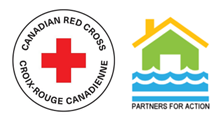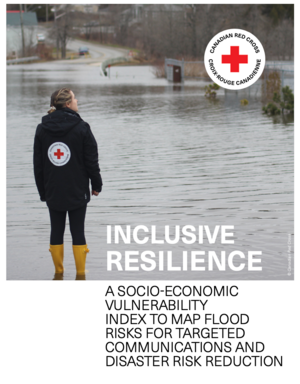Who is most impacted by flooding in Canada?

Mapping Hotspots of Flood Risk using a Social Vulnerability Index
This research is part of the Inclusive Resilience: Driving Risk Awareness to Action and Building Resiliency for Vulnerable Canadians in High-Risk Areas project, funded by the Canadian Red Cross.

The Canadian Red Cross engaged Partners for Action at the University of Waterloo to research socio-economic vulnerability in order to better understand who may be most impacted by natural hazards like floods, wildfires, and earthquakes.
Social vulnerability is not a permanent condition. It can be assessed by indicators that point to conditions that make it harder for people to prepare for, cope with and recover from a hazard during a specific time frame.
P4A has developed a Social Vulnerability Index (SoVI) that combines 50 indicators from the Canadian Census with maps web-based GIS visualizations to provide a spatial analysis of socio-economic vulnerability.
This SoVI can help identify specific geographic areas within communities that will most likely need support before, during, and after hazardous events which are becoming more common and intense with climate change.
About the study
Flood risk is partly due to social vulnerability. Understanding and mapping the drivers of this vulnerability is critical in developing inclusive policies that reduce risk and strengthen resilience for all Canadians. We are applying our cutting-edge Canadian SoVI methodology to flood exposure analysis to identify areas of high and moderate risk.
The result is web-based maps of hotspots of social vulnerability and flood exposure for six communities:
- Richmond, BC
- Thompson, MB
- Ottawa / Renfrew, ON
- Moose Factory, ON
- Ottawa, ON/ Gatineau, QC
- Bay St. George, NFLD
These maps can be used to inform policies and programs that help facilitate targeted solutions and the adoption of risk-based hazard management strategies across Canada. In our current research, we have used 27 publicly-accessible social vulnerability indicators from the 2016 Census grouped into components to help us understand aspects of vulnerability.
Read the Report
Inclusive Resilience: A socio-economic vulnerability index to map flood risk for targeted communications and disaster risk reduction | FRENCH TITLE


Ethics clearance
This study was reviewed and received ethics clearance through the University of Waterloo Research Ethics Board (REB#42933). If you have questions for the Board, please contact the Office of Research Ethics, at 1-519-888-4567 ext. 36005 or reb@uwaterloo.ca.
Learn more
If you have any questions about this study or are interested in collaborating on a project, please contact:
Sharmalene Mendis-Millard
Director
sharmalene.mendis-millard@uwaterloo.ca